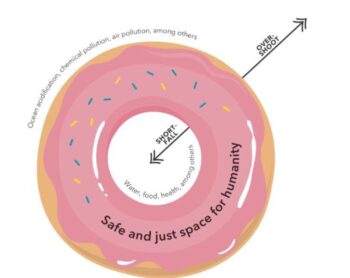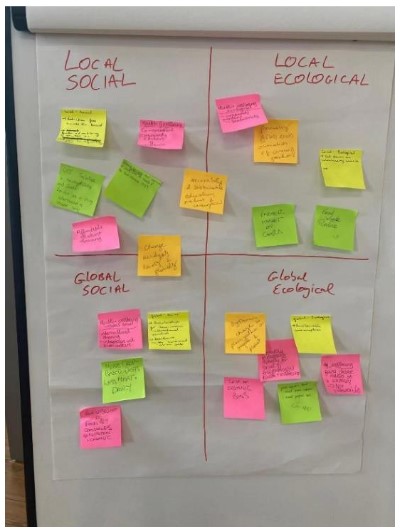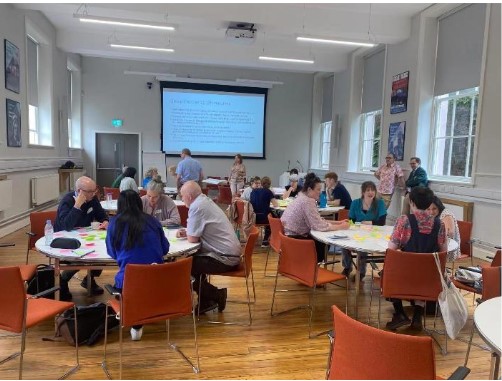
One of the workshops on day 3 of the 2023 Summer School was on Doughnut Economics and was facilitated by UCC lecturers Dr Carol Power, Dr Paul Bolger, Dr Declan Jordan, UCC. We were joined too by Dr Stephen Thornhill who is a Food Security specialist and lectures on the International Development programme at UCC. Chaired by Dr Vittorio Bufacchi, UCC
We are very grateful to them for giving us their time and expertise.
Below is a reflection by some of the participants at this workshop. Well done to all for their considered reflections.
PRAXIS SUMMER SCHOOL 2023
Reflection on the Doughnut Economics Workshop
by
Amanda Sithole, Antonia Schöpf, Mick Bailey, Kate Morrissey, Sean Walsh, Jiani Zhou
Doughnut Economics
Introduction
The Doughnut Economics model offers an innovative approach that integrates socioeconomic development with ecological well-being. It challenges the conventional reliance on Gross Domestic Product (GDP) as the sole indicator of welfare and questions the pursuit of relentless economic growth without considering its repercussions. The Doughnut model (shown in Figure 1) acknowledges that the current economic paradigm perpetuates global socio-economic inequalities and contributes to severe ecological degradation. Its fundamental premise is that society must undergo a profound transformation of its social and economic systems to ensure a dignified standard of living for all while safeguarding the health of the planet (Raworth, 2012).
Figure 1: The Doughnut Economy Model

The concept of the Doughnut was developed by Kate Raworth and published through Oxfam in 2012. Serving as a visual framework, the Doughnut aims to eradicate poverty and foster universal prosperity within the ecological boundaries of the Earth. It emphasizes the urgent need to explore alternative perspectives on well-being and value that account for the welfare of both humanity and the planet.
Methodology – classroom
In the Doughnut Economic Model Workshop, we examined this specific economic concept as it related to 21st Century Communities. First introduced in an Oxfam report by K Raworth it began to be used by interested parties such as United Nations. In Raworth’s 2017 book the concept was further explored in order for diverse Community and business Economic perspectives to be easily understood. The Doughnut consists of an outer layer refereed to a social foundation ensuring life’s essential are provided for. To ensure the protection of the Earths essential elements an Ecological layer is included. Between these layers Communities can thrive in a state ecological, and social environment. It is envisaged that the Doughnut concept will challenge neo-liberalism madness, ensuring prosperity for Communities from the planet’s resources. This approach ensures financial services working for Communities rather than being
the driving force.
The group were asked to paste a note to a topic of interest which included energy food, and housing, we considered under the following headings how Communities, such as UCC reflect while approaching these issues.

The following is a summary of the discussion.
Global Social
Affordable accommodation, an emphasis on ensuring students have adequate access to food supplies while off campus. Examining alternative energy supplies such as wind or hydropower.
Global Ecological
Being energy smart by reducing energy, with installing modern lighting systems, addressing
food waste, ensuring energy efficient buildings.
Local Social
Focused menus when providing food and ensuring distribution of any excess supplies during events.
Encouraging alternative modes of transport reducing the need for car parks.
Accommodation provision in proximity to the College.
Local Ecological
Sourcing of locally produced foods, maintenance of buildings ensuring they are fit for purpose. Providing more accessible charging points for electric car charging.
Local/ global interdependence
Long-term assessment of both the ideal traits of a thriving society and the criteria essential for its equitable and safe growth is required in the pursuit of global sustainability.
The biggest issue facing civilization in the twenty-first century is how to ensure that everyone has access to basic needs without jeopardizing the sustainability of the Earth’s life-supporting systems. A vigorous, well-run society that values important ideals like freedom, justice, equality, a high standard of living, ecological awareness, and political participation is one that is prosperous.
The UN General Assembly approved the Sustainable Development Goals (SDGs) in 2015, which are the centrepiece of the 2030 Agenda for Sustainable Development. The 17 core goals of the agenda’s 169 associated targets will direct global development strategy until 2030. These goals take a novel approach to addressing the social, economic, and environmental aspects of sustainable development. The Millennium Development Goals’ emphasis on human development was coupled with the Rio+ approach to sustainable development in the SDGs, but they also greatly enlarged the topics they covered and emphasized the need for a change in governance strategies- (Kanie & Biermann, 2017). In contrast to previous theories of global development, the 2030 Agenda’s indivisibility, or the idea that the SDGs’ development goals and their targets are inextricably connected. This suggests that attaining more vertical and horizontal policy consistency as well as the involvement of non-state actors would be necessary to accomplish the SDGs.
The first wave of attempts to methodically structure the SDGs by categorizing them in accordance with their primary intended goals were greatly influenced by the framework, popularly known as ‘the doughnut,’ by Raworth- (Raworth, 2017). Raworth’s Doughnut Economics (2017) is a theoretical endeavour to help policymakers reconsider their conceptions of economic development from a socioenvironmental standpoint. Raworth proposes a theory she calls ‘the doughnut of social and planetary boundaries’ to reevaluate the goals of economic policy. The doughnut is made up of twelve universal human needs, which make up our social foundation, and nine planetary boundaries, which form our ecological ceiling. If we compromise the planet’s natural sustainability to maintain our socioeconomic system, the globe will not be able to regenerate. According to Raworth (2017), all economic activity should take place in “the safe and just space for humanity” to maintain our social foundation without going beyond the earth’s natural carrying capacity. To achieve zero environmental impact in all goods and services, infrastructure, and commercial activities, she advocates the application of circular design principles- (Raworth, 2017, p. 217-219). Since, as Raworth (2017) notes, circular designs will continue to benefit the affluent unless redistributive measures are done to address the underlying causes of inequality, circular designs must also be backed by equity principles.
As a result, it is as crucial to concentrate on redistributive initiatives and fight social or political injustices as it is to provide access to basic requirements like water, food, health care, and income in a manner that is ecologically sustainable.
Skills
An essential feature of the workshop was, that it first familiarised the participants with common economic concepts and assumptions, as well as measures. Before engaging with Doughnut economics as an alternative thereof. This enabled the participants to understand common economic systems, critically analyse them, and finally engage with possible alternatives, such as Doughnut Economics. Especially Gross Domestic Product (GDP) as a measure of economic development and productivity of a country was questioned. Therefore, participants acquired
analytical skills, whilst exploring the limitations and implications of current economic systems.
However, economics was also looked at from different perspectives. With speakers from environmental, economic, philosophical, and business backgrounds, the participants managed to grasp Doughnut economics as not only an economic concept but as a holistic and interdisciplinary approach to engaging with different resources. Also, an environmental perspective was opened was introduced and put into the framework of existing economic ideas.
This allowed participants to gain skills in understanding the interconnectivity of issues and engaging with holistic alternatives. What was important for the participants to realise Doughnut economics not only as a thought experiment but as a practical ongoing project. On that account, Amsterdam was considered a city that officially interacts with and implements Doughnut economics. And with the example of the Dutch capital in mind, the participants also applied the concepts to different aspects of UCC life, gaining insight into Doughnut economics not only as a macro-economic rule but rather as practical microeconomic measures. This allowed the participants to tailor these theories to their own circumstances.
Lastly, the workshop also allowed participants to see on a larger scale, how Doughnut economics can also be connected to the Sustainable Development Goals (SDGs).
In conclusion, it can be said, that the Doughnut Economics workshop encouraged the participants to learn a variety of new skills, whether analytical, critical, or practical. This was supported by the different perspectives, which were offered throughout the workshop, but also the focus on interaction and engagement during the workshop.
Values
Kate Raworth, an economist, has devised the economic theory known as doughnut economics, which suggests an all-encompassing method of economics that considers both social and environmental issues. The framework is based on the idea of a “doughnut,” which stands for the just and secure environment necessary for humanity to flourish. The following are some key principles and values of doughnut economics and examples of how they might be applied
in the workplace and in universities (such as UCC):
1. Environmental sustainability: Doughnut Economics emphasizes the necessity to keep operations within the planet’s ecological constraints. This entails taking into account how economic activity affects the environment and pursuing sustainable methods. This can be done at work by enacting eco-friendly policies like trash minimization, energy conservation, and the use of renewable resources.
2. Social justice: The framework also strongly emphasizes social equity and justice. It emphasizes the significance of providing for basic human necessities while making sure that no one is left behind. Organizations might concentrate on fostering diversity and inclusiveness, offering just pay and benefits, and fostering employees’ well-being in order to integrate this value into the workplace.
3. Doughnut Economics promotes a form of economics called regenerative economics, which attempts to replenish rather than drain resources. The circular economy, which encourages recycling, reusing, and mending, must be adopted in place of the linear “take-make-dispose” paradigm. By implementing circular business processes, making things durable, and coming up with creative ways to reduce waste and resource consumption, companies can incorporate this value into their operations.
4. Making decisions collectively: The framework encourages inclusive and participatory decision-making processes. It promotes the interaction and sharing of viewpoints among
participatory decision-making processes. It promotes the interaction and sharing of viewpoints among
participants from varied backgrounds. This can be incorporated at work by promoting a
collaborative environment, involving workers in decision-making, and soliciting feedback
from a variety of voices both inside and outside the company.
5. Doughnut Economics questions the conventional emphasis on GDP as a gauge of economic performance and advocates more holistic measures of growth. It recommends the use of alternative metrics that reflect a more thorough understanding of development, such as wellbeing, social cohesion, and environmental health. Organizations can incorporate this value by using broader criteria to evaluate their impact, taking into account social and environmental results in addition to financial achievement.
6. Long-term planning is encouraged by Doughnut Economics as opposed to short-term thinking. It underlines how crucial it is to consider future generations’ needs while making decisions and acting upon them appropriately. This concept can be applied in the workplace by including sustainability aspects in strategic planning, establishing long-term objectives, and funding sustainable innovation research and development.
Evaluations and Feedback
For Doughnut Economics Attending the Doughnut Economy workshop was a valuable and enlightening experience that expanded my understanding of economic transformation. The workshop resonated with the principles of critical thinking, which had been previously discussed during our sessions. The founder of the Doughnut economy concept critically evaluated the conventional methods of measuring economic growth, challenging their validity by considering important drivers such as human well-being and environmental preservation. This workshop effectively showcased the tangible outcomes that can be achieved through critical thinking. It underscored the prospect of advancing existing practices to enhance societal welfare on a broader scale. This realization highlighted the potential for further improvements in established practices, emphasizing the possibility of benefiting society at large.
Whilst attending this workshop I was informed on the prevalence of doughnut economics from both a sociological and economic perspective in both a local and a global setting. It has also been taught to me, how Doughnut Economics intertwines with many SDGs which are an urgent call for action by all countries – developed and developing – in a global partnership.
They recognize that ending poverty and other deprivations must go hand-in-hand with strategies that improve health and education, reduce inequality, and spur economic growth – all while tackling climate change and working to preserve our oceans and forests. In order to get a better understanding of this topic we used UCC as our case study where we looked at several different sectors (food safety, technology, etc) and how solutions have both advantages and disadvantages.
For me it was especially enjoyable, that there was engagement with current economic models, giving room for critical analysis and illustrating certain limitations. In general, this workshop highly improved my critical thinking. Which was caused by lively interactions with fellow participants.
Attending the Doughnut Economics workshop has been an enlightening and transformative experience for me as a college student. The workshop introduced me to a new economic paradigm that challenges the traditional notions of growth and development. It provided me with a comprehensive understanding of the Doughnut Economics model and its potential to address pressing global issues, such as inequality and environmental degradation.
However, one of the key aspects of the workshop was its methodology, which involved classroom discussions, group work, and presentations. This interactive approach allowed us, as participants, to actively engage with the concepts and critically analyze the current economic systems. It provided us with the opportunity to develop analytical and critical thinking skills, enabling us to question the limitations and implications of conventional economic measures like GDP.
The Praxis summer school proved to be an eye-opening program that had a profound impact on my awareness and understanding of urgent global concerns. The guest speakers and facilitators were exceptionally motivating and engaging, offering a diverse range of topics that encompassed Global Citizenship and Development Education, Global Social Justice, Sustainability, food security, and their interconnectedness with the 17 sustainable goals.
Through presentations, group activities, and workshops the summer school provided me with a comprehensive perspective on the magnitude and intricacy of the global concerns, allowing me to comprehend their significance both at a national and on a global scale.
As a member of the student body here at UCC, I found this summer school to be a very impactful and informative experience, where topics ranging from financial inequality and injustices to human rights were explained in great detail to me, using real-world examples of everyday issues that remain masked from most of the public eye. These workshops have also left me more aware of these issues and how we can make our voices be heard.
The Summer School was an amazing experience for me. What I enjoyed most was the variety of people that participated in summer school, with various backgrounds, ages, and experiences. I found it enriching, that summer school developed into a space where people managed to share their personal experiences openly, overcoming boundaries.
Besides the participants, this diversity was also found in the speakers, who put a special focus on the engagement of the participants. The speakers and guests seemed very authentic and keen on having discussions on eye-level.
The Praxis summer school provides a very comprehensive and well-developed learning experience for university students, even if it is short duration. It effectively introduced participants to key concepts. The different modes of delivery then encouraged participants to think critically and promoted a deeper understanding of alternative economic models that prioritise social welfare and environmental health. The interactive nature of the workshop and the inclusion of different perspectives contributed to a rich and thought-provoking educational
experience. A successful course is not just about how informative it is, rather at the end of the course, participants chew proactively and reflect on the key points and apply them to their daily work, life and studies. However, this summer school has successfully changed my perspective on how to view things, from singularity to diversity, from partial to holistic.
The Praxis global citizenship and development education project discussed a wide range of themes, including global citizenship and development education, global social justice, active global citizenship, and transformative social change. The summer school gave me a thorough understanding of the scope
and complexity of global issues through presentations, group exercises, and workshops, enabling me to appreciate their importance on both local and global scale. The workshop’s participatory format and the inclusion of many viewpoints made for a varied and stimulating educational experience.
One of the key takeaways from the workshop was the critical analysis of conventional economic concepts and measures. We questioned the reliance on GDP as the sole indicator of welfare and explored its limitations and implications. This analytical skill development allowed us to understand the shortcomings of current economic systems and paved the way for exploring alternatives like Doughnut Economics.
However, the workshop emphasized the interdisciplinary nature of Doughnut Economics. With speakers from diverse backgrounds, including environmental, economic, philosophical, and business perspectives, we were able to grasp the holistic and interconnected nature of this approach. It highlighted the importance of considering various resources and their interdependencies while formulating economic policies.
Moreover, the workshop emphasized the practical application of Doughnut Economics, both at the macro and micro levels. We learned about Amsterdam as a city that implements Doughnut Economics and applied its concepts to different aspects of university life, relating it to our own circumstances. This practical perspective enabled us to see the relevance and applicability of these theories in real-world settings.
Furthermore, the workshop highlighted the connection between Doughnut Economics and the Sustainable Development Goals (SDGs). We understood that the principles and values of Doughnut Economics align with the broader objectives of sustainable development, emphasizing environmental sustainability, social justice, regenerative economics, collective
decision-making, and long-term planning.
Overall, the Doughnut Economics workshop provided me with a range of new skills, including
analytical, critical, and practical abilities. It broadened my perspective on economic development and encouraged me to consider alternative metrics of growth beyond GDP. I now value the importance of incorporating environmental and social considerations in decision-making processes and recognize the need for long-term planning and sustainability in all aspects of life, including the workplace and universities. The workshop has inspired me to further explore and advocate for Doughnut Economics as a transformative approach that prioritizes the well-being of both humanity and the planet.
Bibliography
Norichika Kanie, F. B. (2017). Governing through goals: Sustainable development goals as governance innovation. Cambridge: The MIT Press.
Raworth, K. (2017). Doughnut Economics: Seven Ways to Think Like a 21st-Century Economist. In J. Praded (Ed.). Vermont: White River Junction.
